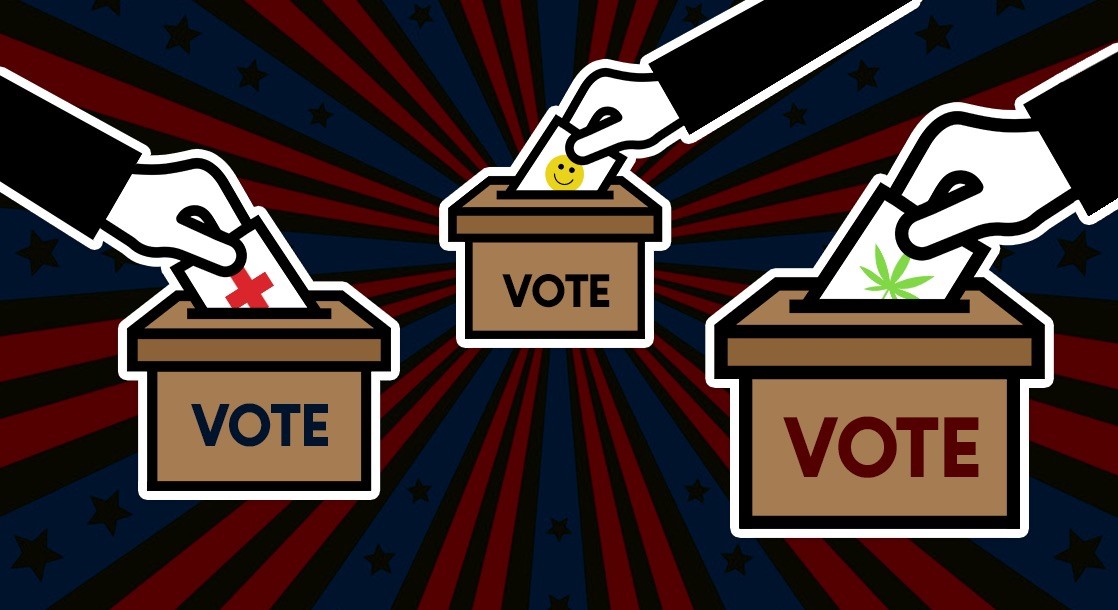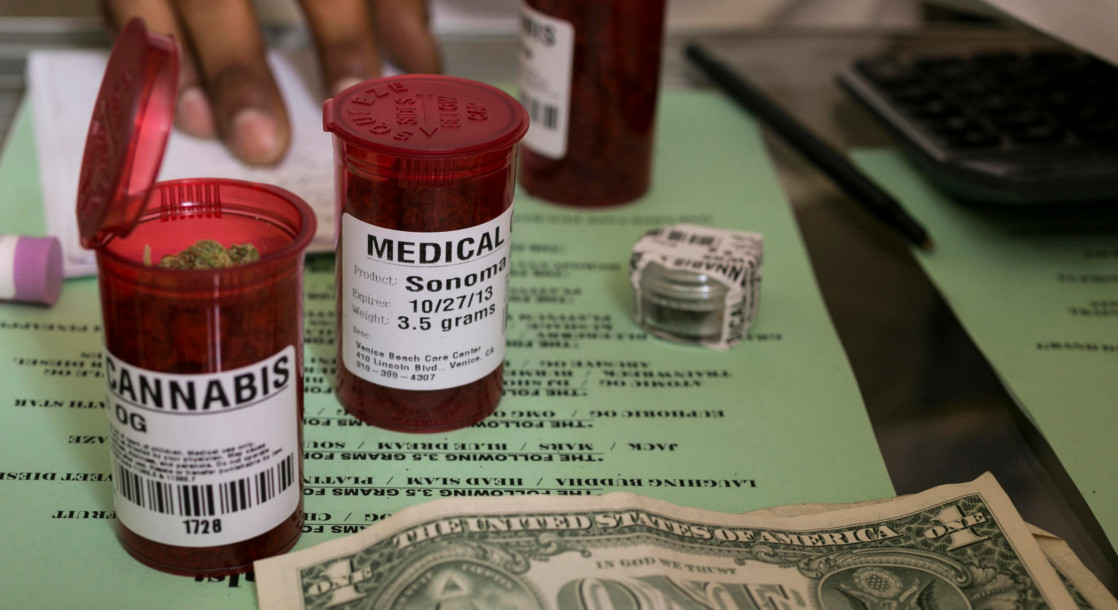The Current Situation
The last major U.S. election in 2016 was at best a mixed bag for many Americans. While cannabis proved popular at the ballot box — with measures to legalize new medical or recreational marijuana programs winning majority support in Arkansas, California, Florida, Maine, Massachusetts, Nevada, and North Dakota — it was only a silver lining for progressives who would have rather seen the Democratic presidential candidate prevail. Since then, the administration of President Donald J. Trump has sowed division between Americans with controversial policy, rhetoric, and appointments to high offices, all seemingly designed to alienate immigrants, people of color, women, and the poor.
Those left appalled by this behavior — including migrant family separation at the U.S.-Mexico border, a major tax cut for America’s plutocrats, and the selection of an alleged sexual attacker to the Supreme Court — are hoping that a surge of angry voters will get behind left-leaning candidates for Congress, possibly allowing Democrats to retake control of the government’s legislative branch and act as a meaningful check on the President. While current polling results for such campaigns appear favorable, their path to victory is uncertain: Electoral observers were also very confident that Hillary Clinton would win the presidency in 2016, and the United States’ volatile political climate is no more predictable this time around.
The ascendance of Trump & Co. in the country’s most critical institutions has also been a confusing time for pot advocates, states which have legalized it, and the growing industry around cannabis. In January of this year, following months of anti-marijuana jabs from Trump’s Attorney General Jeff Sessions, Sessions repealed the Cole memo — Department of Justice guidance issued under the Obama administration for the federal government not to interfere with state-legal cannabis programs. While it was never legally binding in the first place, the memo’s elimination raised concerns among legal cannabis enthusiasts that the Feds were getting ready to take their gloves off and enforce the longstanding federal prohibition on pot.
However, that has largely not come to pass — yet. While federal U.S. Attorneys assigned to canna-legal states including California, Colorado, and Oregon have focused on curtailing illegal marijuana operations in the black market and on federal land, there have been recent rumblings of a wider crackdown on state-approved canna-businesses for reasons including products sales to pregnant women and vaping devices that could appeal to those under age 21 (the health risks of such use are still being debated).
Meanwhile, numerous attempts at federal marijuana reform in Congress have stalled under GOP leadership, despite some of these efforts being led by Republicans. The STATES Act, co-sponsored by Senators Cory Gardner (R-CO) and Elizabeth Warren (D-MA), would legally block the Feds from interfering in any state-approved cannabis program, in a similar fashion to how the budget rider known as the Rohrabacher-Blumenauer amendment keeps them out of state-level medical marijuana. Trump previously indicated he’d support Gardner and Warren’s legislation, and Rep. Rohrabacher just said that the president will tackle cannabis reform after the midterms — but we should we believe them?
This Year’s Stakes
Now, another round of states are taking the issue of cannabis legalization into their own hands. On Tuesday, November 6th, voters in Michigan and North Dakota will decide on whether to legalize recreational cannabis, while residents of Missouri and Utah will vote on medical marijuana. Other states have measures considering expansions of their pot programs, as well as “advisory” questions which essentially ask voters if they’d like to legalize it in some form, without binding politicians to actual action (what a tease).
As far as candidates go, who can you trust? It’s a decision that’s weighing heavily on the minds of many U.S. voters amidst constant partisan combat and accusations of dishonesty plaguing both sides of the aisle. It’s usually simpler to vote on a single-issue ballot initiative than to put faith in a distant candidate to represent one’s vital interests for years into the future.
So along with breaking down all the pot-related initiatives that need voter support next month, we’ve decided to highlight some other important ballot measures across the U.S. that we think are clearer choices for progressives than picking politicians.
As for selecting candidates who actually support marijuana reform, we recommend checking out the Cannabis Voter Project, which has information on where every member of Congress and America’s governors stand on legal pot, so you can decide who to support in electoral races in your area. We don’t have time for folks who hem and haw or equivocate about the legality (or morality) of this plant any longer — vote wisely!
Why Your Vote Counts
Midterm elections in the U.S. have historically had low voter participation, with higher-profile races for president drawing greater turnout. Past midterms have also attracted more Republicans than Democrats, but this time could be different. Recent polls and predictions suggest that midterm voting could hit a new record on November 6th, but that requires everyone who cares to actually follow through to the polls, no matter what else may be happening in their lives and regardless of their doubts about the democratic impact of the ballot box (as well founded as they may be).
This has been easier said than done (we’re exhausted by the political chaos of our era, too), but in this election there’s an array of close races in battleground states that could meaningfully shift the balance of power in Congress, thereby determining what President Trump can and can’t do moving forward regarding marijuana legalization and everything else that matters.
We’re not telling you who to vote for, but we are urging you to pay attention to the causes you care about and make your voice heard this November. With the right mix of office holders, major progress on pot and other matters could be pushed ahead by this election’s results — or we can just continue with America’s crazy status quo if there’s cooler things to do that Tuesday; it’s up to us.
For more state-specific info on voting guidelines for Election Day, check out the Washington Post’s access guide.
And for a list of left-leaning, cannabis-friendly state and local candidates, check out the Democratic Socialists of America’s list of endorsements.
Cannabis Ballot Measures

Below is a comprehensive list of all the cannabis-related state ballot measures in next month’s election. We also included some non-confusing descriptions of each initiative, so you don’t go insane trying to understand legalese at your polling place.
And for those of you whose views happen to align with ours, we also added our personal endorsements for each statewide ballot measure.
Colorado
Amendment X: Definition of Industrial Hemp Amendment
Our endorsement: ¯_(ツ)_/¯
There’s a tricky question for Centennial State voters on the ballot, but it concerns hemp; a variety of cannabis which contains almost no THC but is abundant in CBD — a substance rapidly growing in popularity due to its purported health benefits, sans the heady high of mature marijuana.
Colorado’s ballot will ask voters to affirm or deny Amendment X, which would remove the current definition of “industrial hemp” from the state’s constitution and shift it into a state-level statute, allowing it to be revised by lawmakers at will.
The amendment’s supporters contend that due to the likely prospect of federal reform around hemp laws in the near future, the state must be able to quickly revise its legal definition of hemp in order to match the federal government’s, in order to keep Colorado hemp farms — which have thrived since Colorado fully legalized cannabis in 2012 — competitive nationally. For example, if the federal government legalizes hemp with up to 1 percent THC, then Amendment X supporters such as the Colorado Hemp Industries Association would like state legislators to change its definition in turn, so that farmers can legally grow different varieties than they’re allowed presently (Colorado’s constitution defines hemp as containing less than 0.3 percent THC).
However the amendment’s detractors — including Robert Corry, one of the authors of Colorado’s original legalization measure Amendment 64 — argue that such an revision could undermine the strong protections hemp farmers currently have under the state constitution, which can only be changed by a vote of citizens. In theory, hemp could be re-criminalized completely without constitutional backing.
It seems that this question really comes down to how much Colorado voters trust federal and state lawmakers to regulate hemp properly, or if they’d rather trust their constitution as it stands now to keep hemp’s legal status as is. Tricky, indeed — we trust Coloradans to choose their own adventure on this one.
California
Local measures to remove bans on cannabis sales in certain cities
Our endorsement: Vote Yes
You may be asking yourself, ‘Wait — isn’t weed fully legal in Cali?’ The answer to that really depends on what part of the Golden State you’re in. California voters approved Proposition 64 in 2016 to legalize adult-use cannabis, but that measure also allowed municipalities not so hot on marijuana to “opt-out” of allowing canna-businesses (though they can’t ban use).
Two years later, fewer than one in three California cities allow cannabis sales of any kind, causing some localities to revisit their past decisions on pot. Next month, voters in many of these municipalities will be asked via ballot measures whether or not to welcome weed stores back to the neighborhood. Or, in cities that never blocked pot stores in the first place, constituents will face queries about cannabis taxes, and how they should be allocated.
It’s not too late for these areas to correct their course on legal cannabis, but change will count on motivated citizens to keep up with what’s being voted on locally — the Drug Policy Forum of California’s guide (see under ‘Local Ballot Measures’) is a good place to start, but your local board of elections will also have more information about what’s being voted on this cycle.
(And if you’re in our home base of Los Angeles, check out LA Podcast’s voter guide for a solid breakdown of the local ballot initiatives.)
Ohio
Local measures to reduce penalty for pot possession to the lowest allowed under state law
Our endorsement: Vote Yes
Six cities in Ohio (Dayton, Fremont, Garrettsville, Norwood, Oregon, and Windham; see links for specific ballots) have a chance to reduce criminal penalties for marijuana possession with their votes on November 6th. The Buckeye State is still in the process of implementing a medical marijuana program since legislators approved it in 2016, and while a recreational legalization measure could appear on the state ballot in 2019, its fate is far from certain.
So while Ohioans are still waiting for the chance to purchase any kind of marijuana legally, this is a good opportunity for these municipalities to push reefer reform ahead in the meantime. Each city will ask voters parallel versions of the same essential question: should the penalty for misdemeanor marijuana offenses be lowered to the lowest penalty allowed under state law?
This is a no-brainer: if you live in one of these cities, vote yes to signal to the powers that be that you don’t support the prosecution of pot users!
The bad news is that even if these measures pass, it’s ultimately up to local cops to decide whether to obey them. Norwood’s police chief William Kramer has already said that his department will follow state law rather than defer to local codes regardless of voters’ decision, and this unfortunately aligns with the reality of decriminalization as seen in other parts of the country. Both New York City and Pittsburgh have approved decriminalization policies in recent years, only to witness subsequent increases in arrest rates or minor marijuana “crimes” simply because police never actually changed their practices. Of course, because this is America, minorities made up most of these unjust arrests.
This disturbing dynamic illustrates why decriminalization of marijuana possession may be no substitute for the stronger protections that full legalization offers, but in the interest of reducing legal harm to cannabis users, as well as normalizing use by demonstrating popular support to the political establishment, voting for decriminalization is still better than an uncontested prohibition on the plant.
Michigan
Proposal 1: Marijuana Legalization Initiative
Our endorsement: Vote Yes (obviously)
This is arguably the big one for cannabis legalization this election: voters in the Wolverine State will decide on Proposal 1, which would legalize the use and purchase of marijuana products obtained from state-licensed retailers. Adults over 21 would be allowed to keep up to 10 ounces of weed in their household, grow as many as twelve pot plants, and revise current cannabis-related criminal violations to civil infractions. Retail sales would be taxed at 10% to finance the cost of implementing a legal pot program, as well as “schools, roads, and municipalities where marijuana businesses are located.” As in other canna-legal states, local governments will be able to opt-out of legal marijuana and ban or restrict canna-businesses within their jurisdictions.
While medical marijuana has been legal in Michigan since voters approved it in 2008, the system was only lightly regulated until recently, with the state passing new rules in 2016 and leading a crackdown on hundreds of non-compliant medical pot providers over recent months. Others are seeking new licenses to stay open for business, but the state has lagged in approving applications, increasing frustration among consumers and the industry. A recent case of Michigan police arresting an 80-year-old grandmother with an expired medical marijuana card for possessing less than an eighth of pot also highlights the remaining risks of legalizing only for medicinal purposes — responsible adults can still get caught up in the legal system just for possessing a plant for personal use.
Recent polls have indicated a majority of Michigan voters are supportive of the full legalization measure, and its passage would be a landmark moment for cannabis reform, creating the biggest legal marijuana market in the Midwest. Do the right thing, Michiganders — pot the vote for Prop 1!
Missouri
Amendment 2: Medical Marijuana and Veteran Healthcare Services Initiative
Our endorsement: Vote Yes
Amendment 3: Medical Marijuana and Biomedical Research and Drug Development Institute Initiative
Our endorsement: ¯_(ツ)_/¯
Proposition C: Medical Marijuana and Veterans Healthcare Services, Education, Drug Treatment, and Public Safety Initiative
Our endorsement: ¯_(ツ)_/¯ (but probably vote yes)
The Show-Me State’s ballot this November may prove to be particularly confusing for many, as there’s three different medical marijuana legalization questions for voters to decide between. Support for medical cannabis in general is growing in Missouri, with the state House passing a bill earlier this year that would have legalized non-smokable marijuana products for the terminally ill (the state Senate failed to move it forward). However many state residents have put their efforts behind more expansive ideas for legalizing medical marijuana, yielding enough petition signatures to qualify three different ballot measures for voter review.
Two of these proposals are amendments to the state constitution, meaning that if one of them wins voter approval, it can’t be revised by state lawmakers. Amendment 2, sponsored by New Approach Missouri, would allow doctors to prescribe medical cannabis patients suffering from one of ten qualifying conditions, permit licensed marijuana businesses, and authorize home cultivation of up to six plants for medical users (but they would have to be registered with the state).
Amendment 3, authored and mostly financed by attorney and physician Bill Bradshaw, would allow prescribed medical use and licensed sales of marijuana, but tax it at a much higher rate (15%) than its two competing measures in order to fund the creation of a state research institution with the purpose of “developing cures and treatments for cancer and other incurable diseases or medical conditions.” The determination of qualifying conditions for medical marijuana would be decided by the board of said institute, and It’s also unclear whether home grows would be permitted.
The third proposal — sponsored by Missourians for Patient Care Act, a political action committee — is very similar to Amendment 2, taxing medical cannabis sales at a lower rate (2% vs. 4%) but also banning home cultivation. However this would not be a constitutional amendment, but a new law that state legislators could tinker with for better or worse. Many legalization activists prefer constitutional amendments for precisely this reason: recent examples of legislators revising medical marijuana programs to the consternation of constituents include attempts to ban the use of smokable pot in Florida and severely limit the list of qualifying conditions for cannabis in Oklahoma, even after voters had already approved conflicting provisions.
Accordingly, we think it’s better for pro-pot Missourians to put their support behind Amendment 2, which would offer the ironclad protection of a constitutional amendment while guaranteeing patients the freedom to grow their own medicine. Show us the marijuana, Missouri, and get to the polls on November 6th!
North Dakota
Measure 3: Marijuana Legalization and Automatic Expungement Initiative
Our endorsement: Vote Yes
The Roughrider State’s ballot measure for cannabis legalization is pretty radical for this normally conservative population. If approved by voters, Measure 3 would allow all adults over age 21 to possess, use, grow, and sell cannabis without restrictions (!) — but it being a proposed law and not a constitutional amendment, you can count on lawmakers crafting stricter rules for legal pot if voters sign off on it.
Measure 3 would also amend current code to require the “automatic expungement of the record of an individual who has a drug conviction for a controlled substance that has been legalized.” While California just became the first state in the nation to require such retroactive justice for former cannabis offenders, North Dakota would be the first to mandate it from the start of fully legal weed. What’s the good of legalization, after all, if we can’t agree that regular users shouldn’t have criminal records for reefer?
North Dakota voters aren’t unfriendly to 420, having previously approved legal medical marijuana via ballot measure in 2016, but the state has been slow to license producers and retailers (which aren’t projected to open until 2019), likely contributing to pent-up demand for full legalization. Poll results have been mixed on popular support for this year’s proposal, with an early October survey indicating 59% of likely voters were against recreational pot, while another released this week claims 51% of North Dakotans are in favor of it. With this much uncertainty, it’s critical for the state’s high-minded residents to turn out and vote for legal pot.
Time to turn this red state green, Roughriders! Vote Measure 3!
Utah
Proposition 2: Medical Marijuana Initiative
Our endorsement: Vote Yes
Just getting a medical marijuana measure before voters in Utah has been a Herculean battle, with proponents for this year’s Proposition 2 facing staunch opposition from both Governor Gary Herbert and the Mormon Church — an institution renown for its powerful influence over Utah’s social and legal affairs.
However two weeks ago, government, legislative, and community leaders — including the Mormon Church — announced the formation of a “compromise bill” that would create a state-controlled distribution for medical marijuana and allow its prescribed use for certain qualifying conditions, but with a smaller array of products and valid ailments for treatment than Proposition 2 would permit. With the release of this plan, the Utah Patients Coalition, the primary sponsor of Proposition 2, agreed to stop promoting it in media ads, while opponents pledged to stop inveighing against it publicly. Lawmakers say they will implement its rules regardless of whether Prop 2 passes or fails, meaning that legal medical marijuana is a sure thing for Utahns — that is, if you take such official promises at their word.
Supporters of medical cannabis in Utah are nervous that if Proposition 2 fails, legislators won’t have the nerve to follow through on its medical marijuana bill. Christine Stenquist, founder of patient group Together for Responsible Use and Cannabis Education, worries that the compromise bill is only “political theater” and “not ready for the public.” In light of the uncertainty, state House Minority Leader Brian King, a Democrat from Salt Lake City, reiterated the necessity of turning out to vote for medical marijuana: “I think if you see Prop. 2 voted down, there'll be a lot more hesitation, there'll be a lot more reservation, so I think we need to see Prop. 2 voted up.”
We strongly agree: the best course of action is to reaffirm support for medical marijuana by voting yes to Proposition 2, and send a clear message to Utah’s lawmakers that they can’t renege on this deal. Despite conservative social mores, Utah’s patients deserve access to cannabis-based medicine.
Wisconsin
Local measures asking voters for their legally non-binding opinion on cannabis issues
Our endorsement: Vote Yes
The Badger State is increasingly becoming an outlier among its neighbors as it still prohibits medical or adult-use cannabis, but this midterm, voters in most of the state will at least have the chance to tell officials how they feel about it.
In recent years some states have posed “advisory questions” to voters concerning legal pot. South of Wisconsin’s border, voters in Chicago and Cook County, Illinois weighed in this past March on whether they supported commercial production and use of recreational cannabis, but ‘advisory’ measures do not legally bind officials to implement popular will, they only function as a way to measure public enthusiasm (Cook County’s question won over 68% of voters).
This election in Wisconsin, ballots in the counties of Brown, Clark, Dane, Eau Claire, Forest, Kenosha, La Crosse, Langlade, Lincoln, Marathon, Marquette, Milwaukee, Portage, Racine, Rock, and Sauk (phew), as well as in the cities of Racine and Waukesha, will have various questions (see links for more info) gauging voter opinion on whether they support legalization of medical and/or recreational cannabis, decriminalization around the plant, as well as how tax revenue from legal should be spent.
We guess private polling isn’t as useful for politicians as it seems to be for the rest of us, as a majority of Americans across the country have repeatedly made their approval of cannabis clear. Regardless, we believe Badgers should take the time on November 6th to tell the establishment why legal weed in Wisconsin is no big deal — even if it chooses to ignore public opinion.
Other Important Ballot Measures

Alabama
Amendment 2: State Abortion Policy Amendment
Our endorsement: Vote No
This is another one of those confusingly worded and comically evil ballot measures that attempts to restrict access to safe abortions by claiming that an unborn fetus is equivalent to a human child. Oh, and a fun side note, this bill would also make it state policy for lawmakers to interpret the constitution as “not providing a right to, or funding for abortion services.” Vote no, obviously.
Arkansas
Issue 2: Voter ID Amendment
Our endorsement: Vote No
This amendment would require voters to present a photo I-D when casting provisional ballots. In case you don’t know, a provisional ballot is what you fill out when your eligibility to vote is “in question”. For example, imagine it’s election day, you go to your registered polling place to cast your vote, but you forgot to bring your identification. In this case, you would be offered a provisional ballot, which would be counted once it is confirmed that your name matches the name on the registry.
However, if Issue 2 passes, a person in that same situation above would not be allowed to vote until they presented I-D. That’s voter suppression. Vote no.
Issue 5: Minimum Wage Increase Initiative
Our endorsement: Vote No
Increasing the minimum wage is objectively good. If you disagree, you should probably just stop reading our website. Vote no.
Arizona
Proposition 127: the Renewable Energy Standards Initiative
Our endorsement: Vote Yes
This prop would require electric utilities in Arizona to acquire a yet-to-be-determined percentage of electricity from renewable resources. The earth is dying and it’s our fault, so vote yes!
Florida
Amendment 4: Voting Rights Restoration for Felons Initative
Our endorsement: Vote Yes
Felons should be able to vote. Period. Nobody should have their voice permanently removed from American democracy as a result of a criminal justice system that’s widely known to be unjust and racist. Vote yes to restore the right to vote to felons in Florida.
Idaho
Proposition 2: the Medicaid Expansion Initiative
Our endorsement: Vote Yes
Here at MERRY JANE, we support abolishing our private healthcare system entirely. We think that all healthcare should be free at the point of service, and available to everyone regardless of income or citizenship. But we guess expanded Medicaid is better than nothing. Vote yes.
Missouri
Proposition B: Minimum Wage Initiative
Our endorsement: Vote Yes
Again, if you don’t support raising the minimum wage, why are you even reading this site? Vote yes.
Montana
I-185: the Extend Medicaid Expansion and Increase Tobacco Taxes Initiative
Our endorsement: Vote Yes
This statute would expand eligibility for Medicaid, and pay for it by increasing the tax on tobacco products. This initiative may make your blunts cost a few more cents, but trust us, it’s worth it. Vote yes.
Nebraska
Initiative 427: the Medicaid Expansion Initiative
Our endorsement: Vote Yes
Again, Medicaid is good. Let’s expand it. Vote yes
Nevada
Question 2: Sales Tax Exemption for Feminine Hygiene Products Measure
Our endorsement: Vote Yes
The average period-having person spends thousands of dollars on menstrual products over a lifetime. Frankly, menstrual products should be free, but tax exemption is a good start. Vote yes.
Oregon
Measure 106: Ban Public Funds for Abortions Initiative
Our endorsement: Vote No
This one is confusingly worded, so let’s be clear: a YES vote means that you are in favor of PROHIBITING public funding for abortions. A NO vote means that you DO want public funds to go to abortions. In conclusion, Yes = no public funding for abortions, No = yes to public funding for abortions. Vote NO
Utah
Proposition 3: Medicaid Expansion Initiative
Our endorsement: Vote Yes
Medicaid is good, privately owned healthcare is bad, blah blah blah. Vote yes.
West Virginia
Amendment 1: No Right to Abortion in Constitution Measure
Our endorsement: Vote No
A ‘yes’ vote on this particularly insidious measure would add a sentence to the state constitution that says “nothing in this constitution secures or protects a right to abortion or requires the funding of abortion.” Obviously vote no (and if you disagree, maybe you should consider not being an asshole.)
Conclusion
It’s easy to feel powerless amidst the overwhelming forces of rampant corporate money and an entrenched two-party system which continually ignores the cause of cannabis reform, among other progressive issues, but voting can still yield some big victories. Because of each incremental, state-level step towards pot legalization over previous decades, well over half of the United States has now legalized it in some form. These efforts add up, while putting pressure on federal lawmakers and officials to get their acts (legislative and otherwise) together on marijuana.
We apparently still haven’t reached the tipping point necessary for the U.S. federal government to give up its harmful, costly, and ineffective prohibition on pot, but with states continuing to forge ahead anyway — and America’s neighbors embracing the plant at national levels — how much longer can it realistically resist? Don’t give them any more excuses to ignore our call: voting, for cannabis and everything else, still matters.











